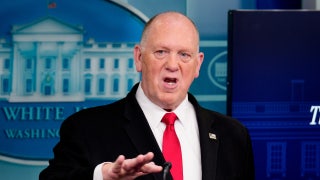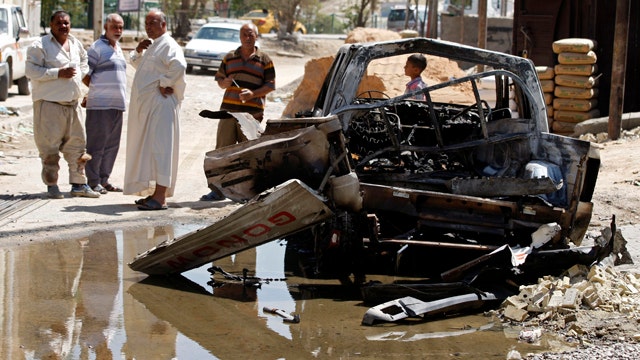What happened when American forces left Iraq?
Lt. Col. Tony Shaffer on the recent rise in violence across the country
Chaos in the Middle East is nothing new.
What we consider in our western perception as “instability” others would consider a normal state of play.
As the Billy Joel Song goes “we didn’t start the fire” – many of the religious conflicts go back two thousand years.
Still, while this is all true, we chose to involve ourselves in the region’s affairs, and we do have continued interests in the long term stability and success of nations in this region– especially Iraq.
[pullquote]
Within the past year in Iraq, there has been continued factional violence – and just last month there were 600 Iraqis killed in various forms of car bombings and acts of terror.
This is not the greatest level of violence we’ve seen in the post-invasion Iraq (in 2006-2007, there were losses of 3,000 per month), but it is significant and troubling.
The United States invested great quantities of blood and treasure into bringing stability to Iraq – with our ‘surge’ of forces in 2007 which resulted in the “Sunni Awakening” which was instrumental in the material defeat of Al Qaeda – or so we thought
The question we must ask ourselves now is simply – did we leave before the investment we made was ready to pay dividends to the Iraqi people?
There are complex issues regarding the three primary groups who inhabit the current borders of Iraq – the Kurds, the Sunni Muslims and Shia Muslims – the latter two being the predominate elements in conflict as the Kurds have begun to function, in the north, as a semi-autonomous (and stable) state.
The Sunni, backed (or at least influence by) the Saudi Arabian government; the Shia backed (or heavily influenced by) the Iranian government.
It is this constant flux of factional religious violence that has made Iraq more and more unstable – and, as we observed this past week, a location full of chaos that has drawn to it Al Qaeda.
The Shiite-led (pro-Iran) government has become more and more “one party rule” in which members of the Sunni factions have been removed – many of the Sunni members of the government were removed just after the U.S. military forces departure, in 2011.
One of the notable observations that is key to the current situation in Iraq, as we saw recently in Egypt, is that political elements that are excluded from having a voice and role in government will turn on and attack that government.
Egyptian President Morsi found out this fact the hard way – with his forcible removal by a popularly supported coup (although many don't want to call by that name).
Sunni Muslim militants are continuing to expand their efforts to attack the central government – which will continue to destabilize the nation, and present opportunities for radical elements to resurge as well.
This militant violence has been an opportunity for Al Qaeda to regain its footing and begin to operate with impunity as we saw in the massive (and operationally sophisticated) jail break of more than 500 prisoners from Iraq’s Abu Ghraib prison this month. A prison in Taji – was also hit but the quick action of guards prevented escapes. The two prisons attacked simultaneously by Al Qaeda show that the terror group is back in force and plenty effective.
The Pentagon had, prior to our departure in 2011, planned to maintain a small but robust military footprint in Iraq – there were negotiations for a ‘status of forces’ agreement that would have allowed a continued military advice and assistance role, as well as counter-terrorism.
Frankly, part of that role was to serve as a guarantor of continued economic and governmental stability – as we were able, through both direct and indirect influence, able to help make sure the Iraqi fledgling democracy was ‘inclusive’ and allowed for all the voices of the various factions of the Iraqi people to be heard. That ended with our departure.
So – without debating the merits of the 2003 invasion – did we leave Iraq too early?
Have we left, in serious doubt, the sustainability of a democracy we helped create?
At its time of its greatest stress, will it flounder?
The breakdown in negotiations in our “status of forces agreement between the Iraqi government and the U.S. government was used to justify our pullout in 2011 – but it was clear then as now, that “breakdown” was the perfect excuse for the Obama White House to abandon the mission.
What is more troublesome is the fact that we now see Al Qaeda growing. It is significant enough that they are now active and conducting effective operations in Iraq. What we need to be aware of is the potential for Iraq to become another base of operations for Al Qaeda to further destabilize Syria.
We still have not sorted out who exactly we are “for” and “against” within the cloud of chaos that is now the insurgency in Syria. Instead of having a stalwart Iraqi as an ally who we could be working with, and using their nation as a base of operations, we have an Iraq that is less than reliable, and may be teetering on the brink of its own collapse.
So – when we look back at the purely political decision to remove all U.S. forces from Iraq, what are we to think? Have we made the very task of “doing something” in Syria even more difficult by our shortsighted policy regarding Iraq?
Most military planners and experts would agree there were strategic interests and reasons to maintain some level of credible and effective military force in Iraq; it was a purely political decision to remove our forces from Iraq.
And now, the apparent downside of that political decision is now become more apparent -- and will likely haunt us as we attempt to conduct military operations in the region -- and more importantly continue to pursue Al Qaeda, which is not, by any analyst’s account “on the run.”
In short, for some sort of meaningful democracy, that guaranteed individual rights, to succeed in Iraq what was almost certainly required was a sustained U.S. presence. It was needed so that Iraq could make the two generation transition in its citizens to begin to think like a democracy.
To quote a retired senior intelligence officer “The U.S. leaving in a huff because the negotiations became hard almost certainly dooms that transition to sustainable democracy…”
Has our political rush to abandon the U.S. mission in Iraq now resulted in the likelihood of more chaos in Syria spilling over from Iraq and a resurgence of Al Qaeda? So far, the evidence is “yes”.









































